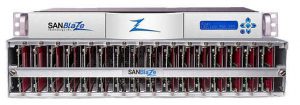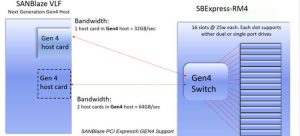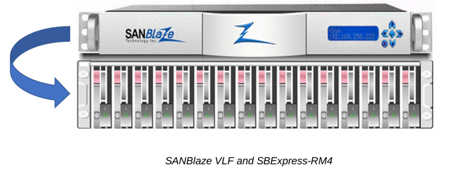FMS: SANBlaze SBExpress-RM4 PCIe NVMe Gen4 Test System
With PCIe Gen4 providing fast interconnect speeds, doubled bandwidth from 16 to 32GB per host adapter
This is a Press Release edited by StorageNewsletter.com on August 11, 2019 at 2:34 pmSANBlaze Technology, Inc. demonstrated its PCIe NVMe Gen4 test system, the SBExpress-RM4 at FMS, providing NVMe SSD manufacturers performance and compliance testing on their NVMe solid state storage drives.
As early adopters, major manufacturers of NVMe Gen4 SSDs have qualified the firm’s Gen4 offering, and the company announced availability of their Gen4 solution during FMS.
Gen4, the next gen PCIe 4.0 doubles the bandwidth from 1GB/s to 2GB/s per lane while providing better signal reliability and integrity for improved performance. With PCIe Gen4 providing the fastest interconnect speeds to date, the SBExpress has doubled its bandwidth from 16 to 32GB per host adapter.
“PCIe Gen4 technology is here, and it’s perfectly matched to the next generation of storage that NVMe Gen4 drives offer. PCIe Gen4 doubles the bandwidth of the storage interconnect and keeps NVMe well ahead of any competing technology,” said Vince Asbridge, president, SANBlaze. “Gen4 also introduces a significant set of challenges to drive manufacturers in terms of qualification infrastructure. Our state-of-the-art SBExpress-RM4 system allows connectivity of up to 16 NVMe Gen4 drives, single or dual path, allowing drive manufacturers to qualify NVMe Gen4 drives at PCIe Gen4 speeds using our certified by SANBlaze suite of automated tests.“
Features in the SBExpress-RM4 include U.2 or U.3 single port or dual port risers; hot plug, slot power, and drive presence under software control; voltage and power measurement at each drive; 6 fans for thermal design; and voltage margining +/- 15%.
In addition to testing PCIe NVMe Gen4 drives, the company offers initiator and target testing of NVMe-oF including NVMe over RoCE, FC, and TCP/IP. In summary, the firm’s tests NVMe over everything and is provider in the NVMe SSD and NVMe-oF testing space.
















 Subscribe to our free daily newsletter
Subscribe to our free daily newsletter

